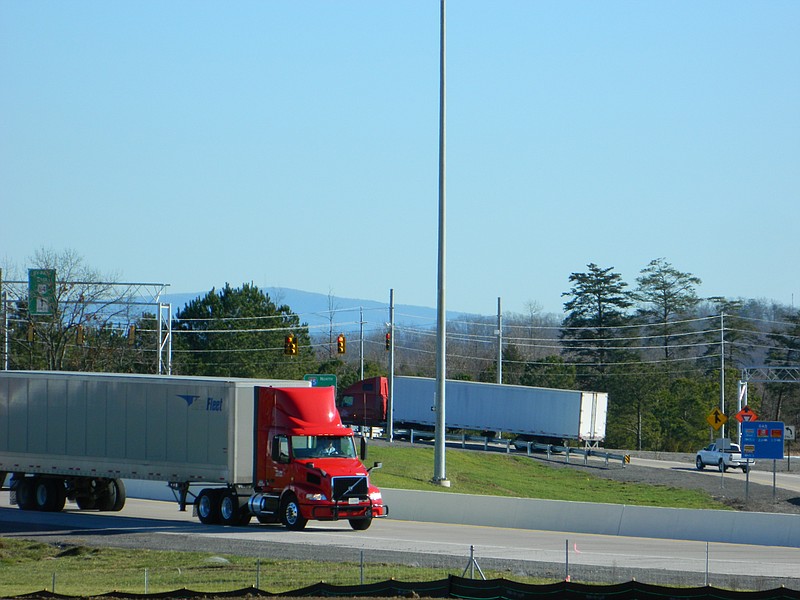No, you're not dreaming. You've heard this story before.
A transportation industry is willing to pay higher taxes so that the infrastructure it relies on will be easier to maneuver.
In 2014, it was barge owners who said they were willing to pay higher taxes in order that replacement dams and locks would be more speedily completed to allow a smoother flow of goods along the nation's waterways.
In 2016, it's the trucking industry which is saying it is willing to pay higher gasoline and diesel taxes to upgrade U.S. highways to reduce traffic congestion.
While we don't subscribe to the blanket policy of raising taxes for every desire, we believe local, state and federal governments should find a way to allow the trucking industry to pay the extra freight it's willing to fork over.
As always, though, the devil will be in the details of such a proposal.
Since more and more tractor-trailer trucks have helped clog the nation's highways, is the trucking industry willing to pay a special tax that other drivers would not? That would be an easier sell to Congress and state legislatures.
Or is the industry anxious to pay its share of higher gasoline and diesel taxes in conjunction with every driver who uses those fuels on the roads? And where do owners of electric cars, who use the same roads but don't pay fuel taxes, fit in? Those would be more difficult questions for Congress and state legislatures to find agreement.
A Chattanooga area trucking executive made the argument for the taxes this week at the regional annual "Thrive 2055" luncheon.
"Raise my fuel taxes," said David Parker, chief executive officer of Covenant Transportation Group and a board member of the American Trucking Association.
"We just can't keep doing what we're doing and not think it's going to hurt the U.S. economy," he said.
The number of trucks on U.S. highways increases every year, and the American Trucking Association predicts freight moved by trucks will increase by more than 26 percent between 2016 and 2027.
Chattanoogans can see it every day in their commutes home from downtown to points east of Missionary Ridge. Ten years ago, on weekdays by 6:30 p.m., eastbound Interstate 24 was typically backup free. Today, on weekdays by 6:30 p.m., eastbound Interstate 24 is typically still backed up.
And, despite signs restricting trucks to the right two lanes, 18-wheelers often occupy all three lanes as they make their slow climb up the Ridge cut, further slowing the commute.
While speedy, convenient public transportation could relieve the clogged interstates, such a thing as a practical matter - despite talk of a limited train system in Chattanooga - is not going to happen by 2027, the year in which the American Trucking Association has said there will be more than 26 percent more trucks on the road.
In the meantime, Parker said the industry is happy to pay additional taxes as long as they go to the national Highway Trust Fund, which has not seen a federal gas tax increase since 1993. Tennessee, despite its high ranking as having some the country's best maintained highways, has not raised its gas tax rate since 1989. Gov. Bill Haslam, though, has talked about an increase for several years and could propose one in the legislative session that begins in January.
A better-funded Highway Trust Fund, whether stocked by higher fuel taxes or part of the $1 trillion in infrastructure spending suggested by President-elect Donald Trump, could help pay for projects such as an Interstate 75 bypass of Chattanooga. Such a project, as detailed in 2012 Times Free Press archives but one on which no consensus has been reached, would run from a point south of Ringgold, Ga., to the Bradley County, Tenn., line and alleviate some of the traffic around the busy I-24/I-75 interchange.
We applaud the trucking industry for its willingness to pay more for the roads it uses and hope the country's infrastructure problems will be the subject of frank discussion during the next congressional session. Given President Barack Obama's wasteful 2010 stimulus program, many in Congress will be rightly wary at the mention of infrastructure spending, but the nation's roads, bridges, airports and ports desperately need repairs.
Increased fees willingly paid by barge owners have sped up work on dams and locks. Now, maybe, increased fees paid by the trucking industry can help move the needle on the country's highways.
